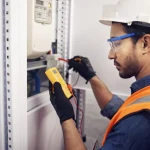For many landlords, owning an HMO property is a hands-off investment that provides a reliable income stream. However, being located far from the property comes with its own set of challenges for remote management. In this post, we’ll explore some tips for landlords who live elsewhere but want to oversee their HMO effectively.
Content
Choosing the Right Letting Agent
When you don’t live nearby, it’s essential to find a letting agent you can trust to handle day-to-day operations. Look for someone experienced with HMO properties who can do regular inspections and be available for emergencies. Ask about fees, services provided, and ways they will communicate issues. A good agent is worth their weight in gold for remote landlords.
Setting Clear House Rules
Establish house rules covering things like noise, cleaning responsibilities, guests, parking, and more. Provide these in writing to all tenants and discuss upon move-in. Clear rules prevent disputes and ensure tenants understand expectations. You may also want to create a group chat so tenants can easily ask questions.
HMO Room Sizes
One important consideration for remote HMO management is ensuring your rooms meet legal size requirements. Legal requirements for minimum HMO room sizes can vary depending on location. Make sure to measure rooms accurately before listing them. Taking digital photos from different angles can also help document proper sizes in case of any disputes down the road. Having accurate room dimensions on file makes resolving maintenance or compliance issues easier to handle remotely.
Using Smart Home Technology
Installing smart home devices can help remote landlords monitor their properties remotely. Security cameras allow visual inspections without a site visit. Smart thermostats, locks and lights also enable remote control and scheduling. Consider what level of remote access respects tenant privacy while aiding management tasks.
Conducting Regular Virtual Walkthroughs
Schedule virtual walkthroughs with your agent using video chat apps. This allows you to visually inspect the property, check for maintenance issues, and interact with tenants face-to-face without traveling. It’s important to maintain regular virtual contact as an absentee landlord.
Maintaining Open Communication
Promptly respond to tenant requests and issues reported by your agent. Be accessible by phone and email during reasonable hours. Quick responses and transparent communication build trust for remote management. Outline preferred contact methods clearly so tenants always know the best way to reach you.

With a passion for matching clients with their dream homes, Mary’s experience and knowledge of the real estate market make her a trusted advisor. She’s your go-to expert for buying or selling properties in the heart of the city.






